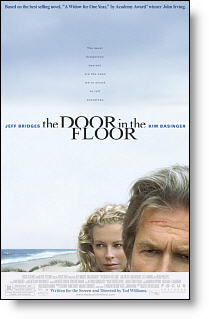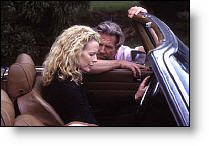The Door in the Floor
 for strong sexuality and graphic images, and language.
for strong sexuality and graphic images, and language.
Reviewed by:
Todd Campbell
CONTRIBUTOR
| Moral Rating: | Very Offensive |
| Moviemaking Quality: |
|
| Primary Audience: | Adults |
| Genre: | Drama |
| Length: | 1 hr. 51 min. |
| Year of Release: | 2004 |
| USA Release: |
August 6, 2004 |




| Featuring |
|---|
|
Jeff Bridges Kim Basinger Jon Foster Elle Fanning Bijou Phillips |
| Director |
|
Tod Williams |
| Producer |
|
This is That Productions (21 Grams, A Dirty Shame, Eternal Sunshine of the Spotless Mind) |
| Distributor |
Here’s what the distributor says about their film: “‘The Door in the Floor’ explores the complexities of love in its brightest, most mysterious, and darkest corners. “The Door in the Floor” is directed by Tod Williams, whose screenplay is adapted from John Irving’s best-selling novel A Widow for One Year.
Set in the beach community of East Hampton, New York, the film chronicles one pivotal summer in the lives of famous children’s books author Ted Cole (Jeff Bridges) and his beautiful wife Marion (Kim Basinger). Their once-great marriage has been strained by tragedy. The Coles lovingly parent their surviving child, bright 4-year-old Ruth (Elle Fanning), who takes everything in stride as perhaps only a child can. But Marion’s equation of love with loss, coupled with Ted’s infidelities, points towards a much-needed change in the relationship. That may come in the form of Eddie O’Hare (Jon Foster), the young man Ted hires to work as his summer assistant—and, Ted hopes, the catalyst to invigorate the Coles’ bond of marriage.
Eddie idolizes Ted, but Ted’s erratic work habits soon leave Eddie to his own devices. Marion becomes an object of desire for Eddie, rekindling in her some surprising emotions as a mother and as a woman. To Eddie’s surprise and delight, his yearning is potently reciprocated.
As he becomes passionately entwined with the seemingly fragile yet increasingly bold Marion, Eddie comes to realize that, similarly, Ted’s surface fecklessness hides something deeper within. As the summer draws to a close, Marion and Ted must make difficult decisions about the future of their family.”
Movies are primarily visual artistic forms; the ideal movie would consist of visual storytelling with no words. Director-Screenwriter Tod Williams almost achieves this ideal through the powerful images and the relative lack of verbal language, which begins in the title sequence showing various squid ink paintings by Ted Cole and continuing with the visual of Ruth pulling a chair down the hallway so she can stand and look at a picture in “The Shrine”—a collection of black and white family photographs which portray almost every family member but emphasizes the twins who died in an accident a few years before the time of the movie.
The first twenty minutes or so of the movie are disconcerting as the images and sparse dialog scenes fade to what appear to be flashbacks but are actually present-time scenes. This complex interweaving of visual and verbal continues throughout the movie, but the connections of the early images to later ones are vital. The first rule of movie making is that every scene has to be important, and while many scenes in this movie should have been left on the cutting room floor, nearly every scene, nearly every image, and nearly every sentence are vital.

Ted’s stories are dark, somewhat like the Leminy Snicket books with a perpetual negativity underlying every word. The stories he uses to ease his 4 year-old daughter’s mind are not tales of triumph and beauty and delight but tales of uncertainty, fear, and unease. His stories reminded me of what we used to call “Shaggy Dog” stories, where the story seems to drag on and on until finally the storyteller ends the story and the listener wonders why he sat there for so long for nothing. Cole’s stories defy any conventional assumption in the reader’s/listener’s mind that the story is actually finished and everything has either worked out well or worked out miserably.
Morality Issues
Ted and Marion Cole are separating for a trial period, a separation which is Ted’s idea, not Marion’s, though she yields reluctantly to her husband’s decision. Later, we find out that Ted is having an affair with Eleanor Vaughn, his current model, but we also discover that he has always been unfaithful to Marion who has turned a blind eye to her husband’s indiscretions. The most obvious issue is marital infidelity and adultery. Both Ted and Marion Cole have affairs in this movie—Ted with his model and Marion with Eddie. However, the motivations behind their affairs are completely different.
Essentially, Ted is a carnal creature who has little more on his mind than sex and food, with a constant desire for something more. Ted’s main characters search for something intangible—an answer, an experience, perhaps wholeness—yet Ted’s own quest results ultimately in bodily satisfaction and pleasure via sex, food, playing squash, and drinking alcohol. Ted is very much a carnal man who exhibits no love or tenderness for anyone outside himself, except for Ruth. The father-daughter scenes are touching and display the closeness they have; however, Ted’s carnality cannot always pacify Ruth after she’s had a nightmare—she wants her mommy instead.
Eddie, an aspiring young writer who serves as Ted’s chauffeur for the summer, is a teenage boy caught up in his sensuality and innocence, confusing lust for love throughout the film. He, too, seeks something—to become a great writer one day—but instead of pursuing his dream, he focuses more on his physical desires and appetites.
The main female characters—Marion and Ruth—are the exact opposite of the males. Marion is a compassionate, nurturing mother who, even in her most carnal moments, tenderly makes love to Eddie, with the emotions radiating in her eyes. She explains later that she had never cheated on her husband before, though he had almost always been unfaithful to her. Marion is unfaithful to her husband because she craves emotional intimacy and honesty, which her husband is unable to give her and young Eddie is too young to understand. At one point, Eddie asks her why she never left him; she replies, “Because he is the only person in the world who really knows me.” Ironically, she actually knows her husband better than her husband knows himself, and he knows very little about her.
Marion is, at heart, tender and sensitive, as is Ruth who uses the pictures in “The Shrine” to ease her mind, calm her fears and uncertainties, and keep her brothers alive in her heart. She notices the smallest details in the pictures and even spends time playing with the pictures, reliving her memories of her brothers. Ruth also has some parts of her father’s nature in that she does focus on the visual, the external, at times more than the internal. She cannot sleep well unless she knows all the pictures are in their proper places on the wall and are “not broken.” She eats only grilled cheese sandwiches with french fries and ketchup. She is also up-front and honest about the human body (which will be discussed later). Yet, when she cuts her finger on a shattered picture frame, or when she has a horrible nightmare, she calls on her mother to comfort and take care of her.
Another issue that creeps up, though I’m not sure which category it falls under, is the emotional impact on a parent who suddenly loses a child. The pictures in “The Shrine” depict the twins at nearly all stages of life, from toddlerhood to adolescence, each picture showing the boys in stages of beauty, wonder, and joy, and occasionally worry. We don’t learn the details of the accident until toward the end of the movie, but the influence of that accident is apparent in nearly every scene with Marion. Her walk is uncertain, her words stammer, her eyes often drift to a distant time. When asked about the accident, Marion turns to stone because she is so horrified to even think about what happened.
I am not a parent, but I am a son, and I know how it feels to lose a mother. To lose a son or daughter, to lose twins, would be almost unbearable. Perhaps, to an extent, Marion is a Job figure, who has quietly suffered many losses but can find no respite without the soothing arms and loving voice of the Father.
I’ve heard people say they are tired of seeing and hearing the adage “Jesus is the Answer.” Sometimes, when the world crashes in and the ground lurches beneath your feet, and you feel that no one can understand the churning darkness inside your heart and mind, the only answer is outside your heart and mind, outside your realm of understanding, outside the weakness the world has to offer. Sometimes, really all the time, Jesus is willing and able to hold you, to lift you, to pour His unconditional love all over you like honey.
Warnings
There are some instances of violence: Ted’s model/lover runs after him with a butcher knife, and his shirt has a bloodstain on the chest. She tries to run him down with her SUV. Ruth cuts her right index finger on a broken picture frame, and she has to have stitches. At one point, Eddie and Ted get into a bit of a fight. The twins’ accident scene is somewhat violent and mentions crushing and a dismembered body part.
Foul language occurs in moments of intense anger or emotion: Specifically, the “f-word” is used when the model/lover confronts Ted’s brushoff, and when the nanny tells Ted off for dumping more responsibilities on her. The Lord’s name is taken in vain a number of times. Overall, the language was not as foul as some movies with PG-13 ratings, but this movie earned its “R” rating for sexuality and nudity.
Nudity occurs within roughly the first 20 minutes of the film when Ruth thinks she hears something in the wall so she wakes Ted up. Ted sleeps in the nude, and Ruth says, “Your penis looks funny.” Ted replies, “That’s because it is funny.” Remember, Ruth is a 4-year-old girl, and the actress playing the part is not much older than her character. Unsettling? While we don’t actually see Ted’s nude body in this interchange, the next scene shows his completely nude back and backside as he carries Ruth to her room. He is nude in an outdoor shower scene when he first meets Eddie, and again we see his entire back and backside.
Marion Cole partially undresses in one scene and is nude in the three sex scenes, each of which portrays a different sexual position. In one scene, Ruth walks in on Marion and Eddie as they are having sex. While movie magic probably prevented Ruth from seeing any real nudity—she is not seen onscreen during this scene—the idea of a 4-year-old child being exposed to this sight is disturbing.
Eleanor Vaughn, Ted Cole’s model/mistress, poses nude in a couple of scenes and is later depicted in the many nude drawings which become scattered all over her yard, her driveway, and her road.
Masturbation is presented in two scenes: one where Eddie is in his bedroom looking at a picture of Marion and the other when Eddie is in an apartment and looking at Marion’s bra and panties which he has arranged on the bed.
Several insinuations of sex and pictures of nude women abound in the movie as well, including Ted Cole’s affairs which are hinted at but are still present, the post-sex smell of the apartment after Ted and his model/lover have left, discussions of sexual experience, petting, and a drawing of a woman’s genitals and breasts in a number of instances.
A final item that disturbed me was the cavalier attitude Ted Cole had toward his own affairs, but when Marion had an affair, at first he was a little upset but he immediately talked about divorce and custody of Ruth rather than realizing he played a large part in the couple’s marital problems. The movie synopsis obtained from the movie’s Web site suggests that Ted hired Eddie to “invigorate the Coles’ bond of marriage.” In no instance did I see Ted Cole show any concern about saving the marriage; in fact, his first interaction with Marion is to tell her he wants a trial separation—will such an announcement save a marriage?
Each of the three main characters in this movie need something which the others cannot give. They seek their answers in places where answers are unreachable. Instead of looking around them to find the completion, instead of relying on other people to be the supply of strength and love and self-esteem, these characters need the One who is the source for all that is whole in the world.
Q & A
 Discover God’s promise for all people—told beautifully and clearly from the beginning. Discover The HOPE! Watch it on Christian Answers—full-length motion picture.
Discover God’s promise for all people—told beautifully and clearly from the beginning. Discover The HOPE! Watch it on Christian Answers—full-length motion picture.
 Discover the good news that Jesus Christ offers
Discover the good news that Jesus Christ offers
Why does God allow innocent people to suffer?
What about the issue of suffering? Doesn’t this prove that there is no God and that we are on our own? Answer
ORIGIN OF BAD THINGS—Why are they in our world if a good God created us? Answer
 Why is the world the way it is? If God is all-knowing, all-powerful, and loving, would He really create a world like this? (filled with oppression, suffering, death and cruelty) Answer
Why is the world the way it is? If God is all-knowing, all-powerful, and loving, would He really create a world like this? (filled with oppression, suffering, death and cruelty) Answer
I sat in this movie and knew the sex scenes were unnecessary, the nudity was unnecessary, and the foul language was unnecessary …because the characters preferred to do things on their own rather than doing things God’s way. We don’t always understand why horrible things happen to good people or why good things happen to horrible people, but God knows. Until we hear otherwise, He is still in control of everything, from the turning of Saturn’s rings to the birth of the smallest insect.
Q & A
Purity—Should I save sex for marriage?
Sexual lust outside of marriage—Why does God strongly warn us about it?
Is there a way to overcome excessive lust for sex?
What is sexual immorality?
How can I deal with temptations?
What are the CONSEQUENCES of sexual immorality? Answer
 Learn how to make your love the best it can be. Christian answers to questions about sex, marriage, sexual addictions, and more. Valuable resources for Christian couples, singles and pastors.
Learn how to make your love the best it can be. Christian answers to questions about sex, marriage, sexual addictions, and more. Valuable resources for Christian couples, singles and pastors.
This movie is very offensive, with strong sexuality and graphic images, including frontal nudity. If you struggle with fleshly desires, do not see this movie. Do not let your children watch it. The movie is, despite the distractions, a thoughtful movie that leaves audiences asking a number of questions at the end. However, it will not amuse you, nor will it likely cause you tell your friends to see it.
Violence: Mild / Profanity: Moderate / Sex/Nudity: Heavy


[Extremely Offensive/1]

My Ratings: [Extremely Offensive/2]